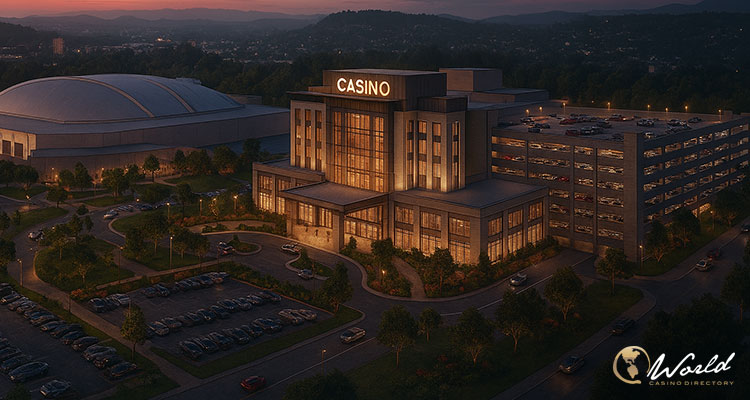City officials in Roanoke are weighing a bold proposal to transform the Berglund Center into a hub for entertainment and gaming, with discussions now underway on the potential addition of a casino. While still in its infancy, the initiative has ignited both optimism and debate about how such a venture could reshape the city’s economic and cultural landscape.
During a Tuesday press conference, Mayor Joe Cobb and City Manager Valmarie Turner announced that the city is exploring development opportunities centered around the 54-year-old Berglund Center. The concept would mirror similar efforts in Virginia cities like Bristol, Danville, Portsmouth, and Petersburg, which have used casinos as anchors for economic growth.
Turner, who stepped into her role earlier this year, described the review as part of a broader effort to evaluate the city’s assets and fiscal outlook. “As the new City Manager, it was essential to begin assessing the City’s financial stability and overall assets, particularly the Berglund Center,” she said, according to Roanoke Rambler. “This initiative presents an opportunity to create an entertainment district that would significantly enhance tourism, stimulate economic growth, and generate increased revenue for both the City and the region—funds that can be reinvested in our neighborhoods, schools, public safety, and infrastructure.”
According to the city’s preliminary outline, the proposed entertainment district could feature a casino, restaurants, new event spaces, a hotel, and expanded parking. In addition to redeveloping the Berglund Center, the plan envisions the area becoming a draw for visitors across the region.
Mayor Cobb emphasized that Roanoke’s central role in Southwest Virginia makes it the natural choice for such a venture. “Whatever people may say, Roanoke is the hub. It’s the heartbeat of this region. And so anything we can do to strengthen that heartbeat and keep it healthy and vital, it’s important,” he said.
Economic Promise and Community Investment
City leaders say the project could bring widespread benefits—hundreds of new jobs, greater tourism, and additional city revenue. Economic Development Director Marc Nelson noted that “the creation of an entertainment district can serve as a catalyst for job creation across the region. From hospitality to gaming to professional services, this is a unique opportunity to build upon our already potent workforce development efforts and to provide good paying jobs that would benefit the region for years to come.”
Officials also outlined how casino-generated revenue could support public needs. Roanoke would receive 6 percent of the first $100 million in gaming revenue each year, which would be directed toward neighborhood improvements, education, infrastructure, and public safety.
Cobb added that the plan fits into Roanoke’s broader strategy of spurring local innovation and tourism. “The goal for this project is to inspire economic growth through increased entertainment, dining, and lodging options, with a refurbished civic center,” he said in a statement posted on the city’s official website. “As Roanoke continues our vibrant growth in economic innovation, we are excited about creating new opportunities for residents and tourists alike to explore our Star City.”
Challenges and Legislative Hurdles
Despite enthusiasm from city leaders, the proposal faces significant procedural and political challenges. Under Virginia law, a casino requires authorization from the General Assembly, approval by the governor, and a local voter referendum.
Complicating matters further, two Republican lawmakers representing parts of Roanoke—Sen. David Suetterlein and Del. Joe McNamara—quickly voiced their opposition. In a joint statement, Suetterlein criticized the choice of location, saying, “The City should not double down on its terrible decision to use eminent domain against Roanokers during ‘urban renewal’ to build the civic center decades ago by installing a casino there now.”
McNamara raised concerns about the financial and social implications, calling the project a “budget gamble” that could harm local businesses. “I see a casino as being an incubator of bad things in the Roanoke Valley,” he said. “I think it will increase crime, prostitution, trafficking. There’s just a world of bad things that can come with a casino.”
Democratic Delegate Sam Rasoul, who has previously voted against casino legislation, echoed those reservations, stating, “I have voted against all of the casinos in the past. I think that there are better ways of investing in growing local economies.”
Local Impact and Community Considerations
City leaders have pledged to engage nearby neighborhoods—especially the Gainsboro community, which has deep ties to the Berglund Center site and the city’s history of urban renewal. “It’s going to be important to have conversation with people who live adjacent to this who understand some of the history and to find ways that we can dedicate some of the revenue,” Cobb said.
Officials confirmed that they have signed non-disclosure agreements with a potential casino operator, though no specific partner has been named. They also acknowledged that major details—including project costs, timelines, and state legislative sponsorship—remain undetermined.
For now, the city has positioned the initiative as a long-term economic development study rather than a finalized proposal. “This initiative is about reimagining what’s possible,” Turner said. “We’re committed to a thoughtful and transparent process and will provide more information as it becomes available.”
Whether the city ultimately hits the jackpot—or folds under public opposition—may depend on how Roanoke balances ambition with caution as it seeks to transform one of its most recognizable landmarks into a new engine of growth.


